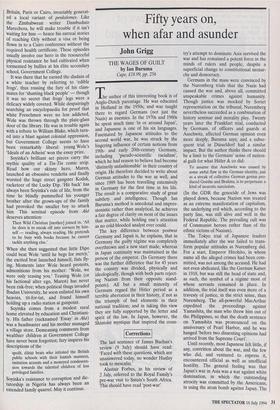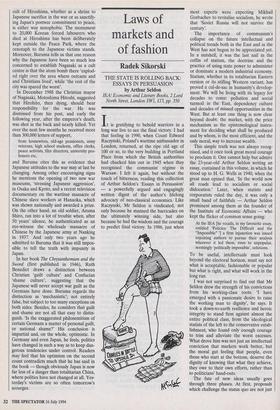Fifty years on, when afar and asunder
John Grigg
THE WAGES OF GUILT by Ian Buruma Cape, £18.99, pp. 256 he author of this interesting book is of Anglo-Dutch parentage. He was educated in Holland in the 1950s, and was taught there to regard Germans (not just the Nazis) as enemies. In the 1970s and 1980s he spent much time 'in or around Japan', and Japanese is one of his six languages. Fascinated by Japanese attitudes to the second world war, he was struck by the lingering influence of certain notions from 19th- and early 20th-century Germany, including 'pseudo-scientific racialism', which he had reason to believe had become 'distinctly unfashionable' in their country of origin. He therefore decided to write about German attitudes to the war as well, and since 1989 has been travelling extensively in Germany for the first time in his life. The result is a comparative study of great subtlety and intelligence. Though Ian Buruma's method is anecdotal and impres- sionistic rather than analytical, he achieves a fair degree of clarity on most of the issues that matter, while holding one's attention as no cold-blooded analyst ever could.
The key difference between postwar Germany and Japan is, he explains, that in Germany the guilty regime was completely overthrown and a new start made, whereas in Japan continuity was maintained in the person of the emperor. (In Germany there was the further difference that for 45 years the country was divided, physically and ideologically, though with both parts reject- ing Nazism from their opposite stand- points). All but a small minority of Germans regard the Hitler period as a terrible aberration in their history, if not as the triumph of bad elements in their national tradition; and in taking this view they are fully supported by the letter and spirit of the law. In Japan, however, the Shintoist mystique that inspired the coun- try's attempt to dominate Asia survived the war and has remained a potent force in the minds of rulers and people, despite a superficial change to constitutional monar- chy and democracy.
Germans in the mass were convinced by the Nuremberg trials that the Nazis had caused the war and, above all, committed unspeakable crimes against humanity. Though justice was mocked by Soviet representation on the tribunal, Nuremberg nevertheless succeeded as a combination of history seminar and morality play. Twenty years later the Frankfurt trial, conducted by Germans, of officers and guards at Auschwitz, affected German opinion even more deeply, Buruma says; and a subse- quent trial in Dusseldorf had a similar impact. But the author thinks there should be a limit to the Germans' sense of nation- al guilt for what Hitler & co did:
To assume that Auschwitz was caused by some awful flaw in the German identity, just as a streak of collective German genius pro- duced Goethe and Brahms, is to perpetuate a kind of neurotic narcissism.
(In the GDR the genocide of Jews was played down, because Nazism was treated as an extreme manifestation of capitalism, the underlying evil which, according to the party line, was still alive and well in the Federal Republic. The prevailing cult was of Communist heroes rather than of the ethnic victims of Nazism).
The Tokyo trial of Japanese leaders immediately after the war failed to trans- form popular attitudes as Nuremberg did. For a start, Emperor Hirohito, in whose name all the alleged crimes had been com- mitted, was not among the accused. He had not even abdicated, like the German Kaiser in 1918, but was still the head of state and, as such, the symbol of a regime most of whose servants remained in place. In addition, the trial itself was even more of a travesty of justice, in the strict sense, than Nuremberg. The all-powerful MacArthur expedited the proceedings against Yamashita, the man who threw him out of the Philippines, so that the death sentence on Yamashita was pronounced on the anniversary of Pearl Harbor, and he was hanged 'before two dissenting opinions had arrived from the Supreme Court'.
Until recently, most Japanese felt little, if any, contrition about the war, and the few who did, and ventured to express it, encountered official as well as unofficial hostility. The general feeling was that Japan's war in Asia was a war against white domination, in which the outstanding atrocity was committed by the Americans, in using the atom bomb against Japan. The cult of Hiroshima, whether as a shrine to Japanese sacrifice in the war or as sanctify- ing Japan's postwar commitment to peace, is either way xenophobic. The monument to 20,000 Korean forced labourers who died at Hiroshima has been deliberately kept outside the Peace Park, where the cenotaph to the Japanese victims stands. Moreover, Buruma tells us that one reason why the Japanese have been so much less concerned to establish Nagasaki as a cult centre is that the atom bomb there 'explod- ed right over the area where outcasts and and Christians lived', while 'the rest of the city was spared the worst'.
In December 1988 the Christian mayor of Nagasaki, Motoshima Hitoshi, suggested that Hirohito, then dying, should bear responsibility for the war. He was dismissed from his post, and early the following year, after the emperor's death, was shot in the back and nearly killed. Yet over the next few months he received more than 300,000 letters of support, from housewives, old-age pensioners, army veterans, high school students, office clerks, peace activists, film directors, university pro- fessors etc, and Buruma cites this as evidence that Japanese attitudes to the war may at last be changing. Among other encouraging signs he mentions the opening of two new war museums, 'stressing Japanese aggression', in Osaka and Kyoto, and a recent television documentary on the wartime massacre of Chinese slave workers at Hanaoka, which was shown nationally and awarded a prize. On the other hand, an old soldier, Azuma Shiro, ran into a lot of trouble when, after 50 years' silence, he authenticated as an eye-witness the wholesale massacre of Chinese by the Japanese army at Nanking in 1937. And only two years ago he admitted to Buruma that it was still impos- sible to tell the truth with impunity in Japan.
In her book The Chrysanthemum and the Sword (first published in 1946), Ruth Benedict draws a distinction between Christian 'guilt culture' and Confucian 'shame culture', suggesting that the Japanese will never accept war guilt as the Germans have done. Buruma regards the distinction as `mechanistic'; not entirely false, but subject to too many exceptions on both sides. Besides, he considers that guilt and shame are not all that easy to distin- guish. 'Is the exaggerated philosemitism of certain Germans a matter of personal guilt, or national shame?' His conclusion is impartial and, on the whole, optimistic. In Germany and even Japan, he feels, politics have changed in such a way as to keep dan- gerous tendencies under control. Readers may feel that his optimism on the second count contradicts much that he has said in the book — though obviously Japan is now far less of a danger than totalitarian China, where politics have not changed at all. Yes- terday's victims are so often tomorrow's scourges.



















































 Previous page
Previous page